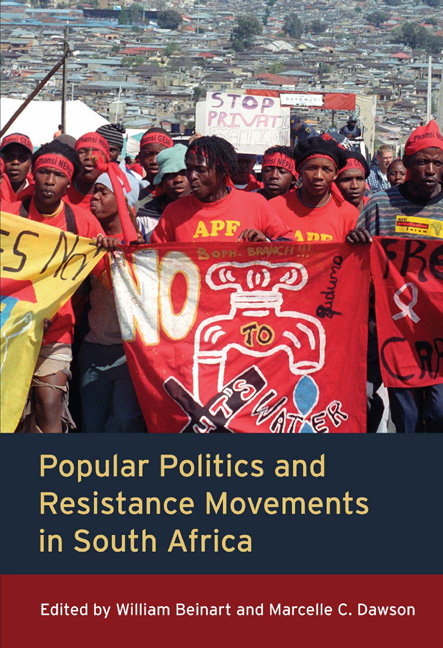Book contents
- Frontmatter
- Contents
- Contributors
- List of Abbreviations and Acronyms
- 1 Popular politics and resistance movements in South Africa, 1970–2008
- 2 The Durban strikes of 1973: Political identities and the management of protest
- 3 ‘There's more to it than slurp and burp’: The Fatti's & Moni's strike and the use of boycotts in mass resistance in Cape Town
- 4 The role of the African National Congress in popular protest during the township uprisings, 1984–1989
- 5 Strategies of struggle: The Nelson Mandela campaign
- 6 From removals to reform: Land struggles in Weenen in KwaZulu-Natal, South Africa
- 7 From popular resistance to populist politics in the Transkei
- 8 ‘It's a beautiful struggle’: Siyayinqoba/Beat it! and the HIV/AIDS treatment struggle on South African television
- 9 The Nelson Mandela Museum and the tyranny of political symbols
- 10 Black nurses’ strikes at Baragwanath Hospital, Soweto, 1948–2007
- 11 The ‘New Struggle’: Resources, networks and the formation of the Treatment Action Campaign (TAC) 1994–1998
- 12 New social movements as civil society: The case of past and present Soweto
- 13 ‘Phansi Privatisation! Phansi!’: The Anti-Privatisation Forum and ideology in social movements
- Endnotes
- Bibliography
- Index
12 - New social movements as civil society: The case of past and present Soweto
Published online by Cambridge University Press: 21 April 2018
- Frontmatter
- Contents
- Contributors
- List of Abbreviations and Acronyms
- 1 Popular politics and resistance movements in South Africa, 1970–2008
- 2 The Durban strikes of 1973: Political identities and the management of protest
- 3 ‘There's more to it than slurp and burp’: The Fatti's & Moni's strike and the use of boycotts in mass resistance in Cape Town
- 4 The role of the African National Congress in popular protest during the township uprisings, 1984–1989
- 5 Strategies of struggle: The Nelson Mandela campaign
- 6 From removals to reform: Land struggles in Weenen in KwaZulu-Natal, South Africa
- 7 From popular resistance to populist politics in the Transkei
- 8 ‘It's a beautiful struggle’: Siyayinqoba/Beat it! and the HIV/AIDS treatment struggle on South African television
- 9 The Nelson Mandela Museum and the tyranny of political symbols
- 10 Black nurses’ strikes at Baragwanath Hospital, Soweto, 1948–2007
- 11 The ‘New Struggle’: Resources, networks and the formation of the Treatment Action Campaign (TAC) 1994–1998
- 12 New social movements as civil society: The case of past and present Soweto
- 13 ‘Phansi Privatisation! Phansi!’: The Anti-Privatisation Forum and ideology in social movements
- Endnotes
- Bibliography
- Index
Summary
‘A radical transformation in South Africa will depend more on how the past is remembered than on how the future is plotted.’
Introduction
Manuel Castells has argued that urban social movements were the front line of ideological revolutions – the sites where new alternatives to dominant hegemony were created. This chapter compares two eras of South African urban social movements, both of which are regarded here as exemplary models of Castells’ radical urban movements in that they constitute an attempt to instigate a revolutionary redistribution of power. In an effort to shed light on various dimensions of continuity and change in popular resistance movements in South Africa, the discussion contrasts the Soweto Civic Association (SCA), formed under the apartheid regime in 1976, and the Soweto Electricity Crisis Committee (SECC), formed in 2000 within a democratic political context. The SCA was a prominent part of the civic movement, which witnessed the mobilisation of hundreds of township communities into organised groups that protested effectively against the apartheid state in the 1970s and 1980s. The SECC is a prominent member of the group of community organisations – referred to as the country's ‘new social movements’ – that have emerged in the last ten years in South Africa. The mobilisation efforts of the SECC's community activists target a wide range of issues, but the key focus of their activism centres on what they call ‘the basics’, i.e. electricity, water, housing, education, health and employment.
The re-emergence in the last decade of distinct and familiar forms of community organisations in South Africa has understandably prompted comparisons between these new social movements and the anti-apartheid groups that they appear to resemble. Patrick Bond argues that while ‘[c]ivil society organising in South African cities has a long tradition … the historical memory of activists to the intense apartheid urban repression during the 1960s–70s might be the most important precursor of contemporary civil society’. He argues that the civics movement shared with the new social movements a political vision of being ‘for the “globalisation of people”, and against “the globalisation of capital”’. The media have offered less nuanced comparisons when reporting the violence that has repeatedly erupted over the last five years in South Africa over the lack of service delivery.
- Type
- Chapter
- Information
- Popular Politics and Resistance Movements in South Africa , pp. 243 - 265Publisher: Wits University PressPrint publication year: 2010



